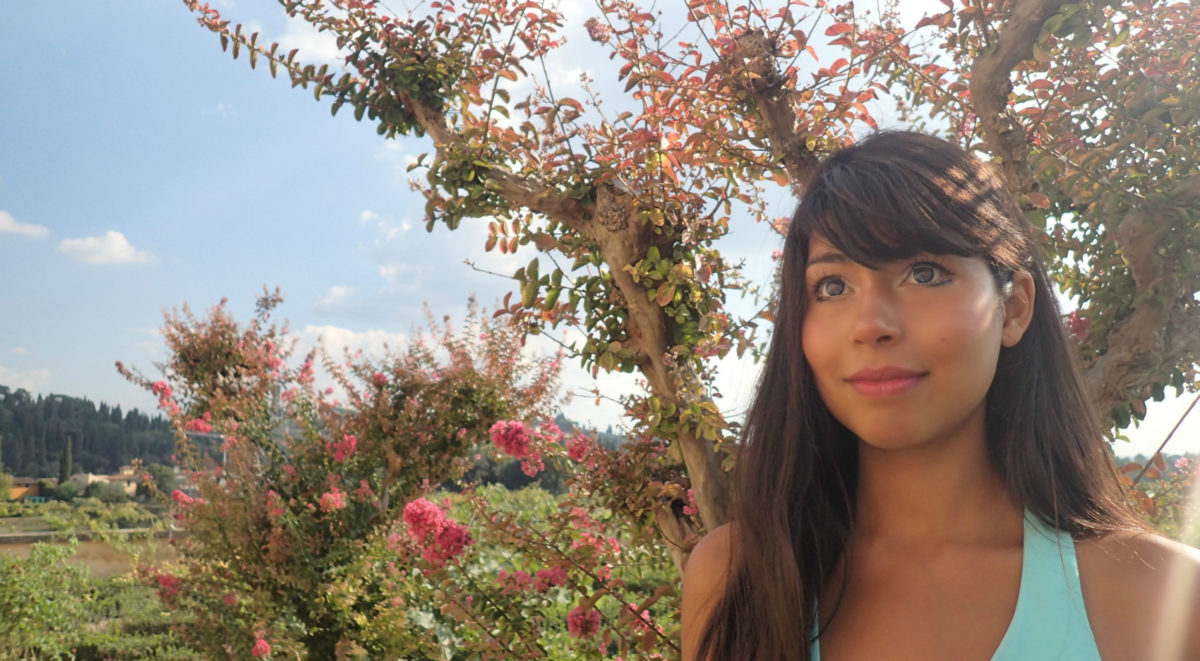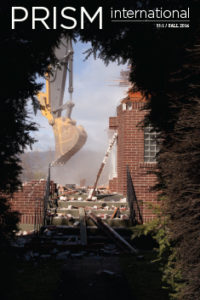
Rachael Moorthy is an emerging Canadian writer and recent graduate of the University of Victoria, where she studied fiction, poetry, and screenwriting. Her poetry and prose have appeared in Young Writers of Canada and This Side of West, and she is an active member of the 3.7 Initiative in Vancouver, a collective of artists which aims to increase diversity in the film and theatre industry. She is currently working on her first novel, Instructions for Living.
PRISM is proud to have published Rachael’s short story “Waning Moon Swells” in Issue 55.1. Editorial Board member Rachel Jansen caught up with Rachael Moorthy below.
I can see that surfing and the sea are a big part of your work. I’m curious, how does surfing inform your artistry? Do you pull inspiration from surfing, or do you think you’re pulled towards surfing because of your artistic inclination?
It’s kind of a fluid thing, fittingly. I’ve always been enchanted by the way water works. I was a competitive swimmer and water polo player growing up, and I come from a long line of thalassophiles. My grandfather was a diver in the navy and my mom was an island girl for most of her formative years. I read somewhere that there might be a genetic component to seafaringness, which I think is pretty neat. In this piece, specifically, I drew a lot of imagery from my own previous surfing experience on the BC coast. Vancouver Island is a stunning, temperate-rainforest wonderland, infused with such rich, idiosyncratic character. I think it’s impossible not to get inspired by it. Surfing really nurtures introspection because it’s such a meditative sport; it’s all about timing and unity with nature. I think there’s something inherently poetic about surfing because you never ride the same wave twice; it’s like this transient energy, and you have to develop equanimity with the ocean. Overall, I guess I’d say that they inform each other. While I definitely get a lot of writing material from surfing, I also experience everything through an artistic lens, and I’m not really sure that I have a choice in that.
I love the female friendship dynamic you’ve created between Nads and Chandra in “Waning Moon Swells.” Is it important to you to explore femininity in your writing?

It’s essential for me to explore the complexity, fluidity, and diversity of femininity in my writing; it’s like a labyrinth. I’m really interested in female protagonists with innovative storylines, where the narrative doesn’t revolve around romantic love, and where female characters have a lot of agency. The “passive female” is fairly familiar and prevalent in both classic and contemporary film and literature, so I think it’s exciting and important to delve into all of the alternative and relatively unexplored facets of femininity.
In a piece that centers so much around the female body and the characters’ perceptions of it, the line, “How little of our bodies we are,” stuck out for me. Could you speak to it a little?
That is really the heart of the piece. I got really obsessed with mind/body philosophy after a family member was in a car accident which resulted in quadriplegia when I was around 18 or 19. Intellectualizing that someone who could not lift their arm or speak could still listen to Van Halen, see colours, taste, feel emotions, and remember faces and experiences really struck something in me. Oddly enough, the same individual and I had a shared admiration for Stephen Hawking prior to his accident. I didn’t even really think about Hawking’s physical condition, I was just in awe of his theories. Naturally, it affected me on a much more visceral level when it was close to me, so that’s one thread. Then, there’s the fact that we live in this increasingly vain, visual, and diet-obsessed culture. I fall victim to it as much as anyone, so I’m a total hypocrite (I’m really trying to investigate this). Women, especially, have been reduced to their bodies and to the reproductive functions of their bodies throughout history, so I think it’s something we internalize, and a really challenging thing for society to unlearn. Ultimately, though, we are all so much more than our physical forms. Ironically, I think that we can see one another with more clarity in the dark, where things like skin colour, sex, body shape, class, or what have you, are rendered obsolete. That’s what I was trying to show in that scene.
Your prose is superb; it’s so evocative and sensual. Do you have any tips for writers on how to step away from the familiar or cliché in terms of imagery?
Why thank you! I owe that to meticulous word choice. In order to avoid familiar images, I think it’s a good practice to really question your first instinct. Ultimately, I think it’s a case of looking deeper and approaching things from a new angle, while trying to reveal some sort of truth. I personally think that (most) clichés are an oversimplification of the distinctive character that everything and everyone has to offer. As far as diction goes, the one suggestion I have is the same one that has been suggested to me countless times by every writer I revere, and that is to read more. I like short stories because of the careful prose and how much variety you can get in a condensed time frame. I also really like contemporary poetry because I think that modern poets are masters of conquering the cliché and inventive language.
What kind of setting do you feel most productive in when you’re writing?
This is something I’m still cultivating, but I am a huge advocate of going on solo outdoor adventures to ignite some creative flow; I usually have to isolate myself somewhere to write. I have really heightened senses so unfortunately I can’t be around too many people, sounds or smells. I work well with deadlines and achievable, daily tasks, for example, breaking up a story into scenes and giving myself an allotted time to work on something. That’s just what works for me because I’m a very routine-based person. Also, I like to have writer/artist friends that I can vent to and vice versa. I find it helps get me out of my own head.
Do you have any upcoming projects that you’re working on?
I do! I have recently completed three short stories and two screenplays, and I am currently writing my first novel, Instructions for Living.
Rachel Jansen is currently completing her MFA at the University of British Columbia. Her work has appeared in The Maynard and is forthcoming in Hamilton Arts & Letters. She sits on the Editorial Board of PRISM international.